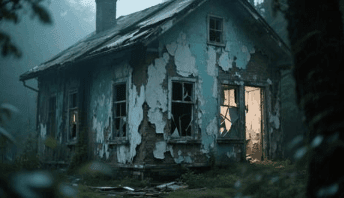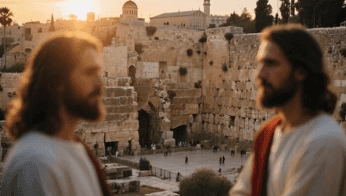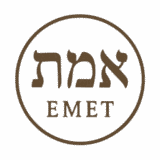Behold : Your House Is Left Unto You Desolate Forever
When Jesus spoke these words over Jerusalem, He was not speaking in casual language. This was a pronouncement of both judgment and deep grief. In fact, in the very verse before, He had cried out, “O Jerusalem, Jerusalem, you who kill the prophets and stone those sent to you, how often I wanted to gather your children together, as a hen gathers her chicks under her wings, but you were not willing!” The following declaration, “Behold, your house is left unto you desolate,” was the solemn conclusion to a long history of rejection, stubbornness, and spiritual blindness.
The Hebrew equivalent for this phrase, הִנֵּה נֶעֱזַב לָכֶם בֵּיתְכֶם שָׁמֵם (Hinnēh neʿĕzav lākhem beitkhem shāmēm), carries profound layers of meaning. The very first word, Hinnēh, translated as “behold,” is a divine spotlight. Whenever the Scriptures use this word, it is a summons to pay close attention, almost as if God were lifting His finger and pointing at what follows. It means: stop, look, and understand. Jesus was calling His hearers not to miss the gravity of the moment. The letters of this word already preach: the Heh (ה) represents revelation and breath, the Nun (נ) speaks of life, and then again Heh (ה) appears. It is as if God is saying, “Here is a revelation about life that you must not ignore.”
The next word, Ne’ezav, means “is left” or “is abandoned.” It comes from the root עזב (azav), which means to forsake, leave behind, or let go. This word is tragic when applied to God’s dwelling. The Temple was supposed to be the place where heaven and earth met, where God’s presence filled the Holy of Holies, where His glory rested above the Ark of the Covenant. Yet now Jesus declares that this house is abandoned, no longer the resting place of God’s presence. The letters illustrate this drama. The Nun (נ) for life is followed by Ayin (ע), the eye, which here represents blindness rather than sight. Then comes Zayin (ז), a weapon or cutting edge, showing separation. Finally Bet (ב), the house, stands at the end. Put together, it paints a picture of life being cut off, the eye blind, the weapon dividing, and the house left behind. Spiritually, this is a chilling image. A house without God is just stone and dust.

Jesus continues with lākhem, “to you.” The ownership shifts here. It is no longer God’s house, no longer His Temple. Now it is only “yours.” What once was holy has become merely human. This is the tragedy of religion without God. You may still have rituals, buildings, and traditions, but without His presence, it is lifeless. The letters teach this too. Lamed (ל) is teaching, Kaf (כ) is possession, the palm of the hand, and Mem (ם) represents water or chaos. Together, they speak of teaching and ownership in human hands that ends in confusion.
The word Beitkhem — “your house” — cuts even deeper. In Hebrew, בית (bayit) is not just a physical house but also a household, a family, a dwelling place. Originally, God had called Israel His house, His dwelling. But now Jesus calls it “your house.” The sense of God’s ownership has been removed. The letters tell a story here as well. Bet (ב) is the house, Yod (י) the divine hand, and Tav (ת) the covenant sign. In its fullness, a house is meant to be a dwelling where God’s hand is active and where His covenant is the foundation. But when His hand is rejected and His covenant broken, what remains is only walls and emptiness. This was the tragedy of the Temple: a glorious structure, but without the Shekinah glory, it was only stone.
Finally, Jesus declares it Shamem — desolate. This word is not simply “empty.” In Hebrew, it carries the sense of devastation, ruin, and lifelessness. It is the word used in Daniel when he speaks of the “abomination of desolation.” The imagery is of shock, of onlookers staring at ruins with horror. The letters intensify the meaning. Shin (ש) symbolizes fire and consuming teeth. Mem (מ) represents waters and chaos. The final Mem (ם), closed in form, symbolizes finality, an end. Fire, flood, and final emptiness — this is the fate of a house abandoned by God.
So when Jesus spoke these words, He was not simply predicting the destruction of the Temple in AD 70, though that was part of it. He was unveiling a spiritual reality: when people reject God’s presence, His truth, and His Son, what is left is an empty house. The outward form may remain for a time, but the inward life is gone. Religion without God becomes desolate. A life without God becomes desolate. Even the grandest house becomes hollow without His Spirit dwelling within.
And yet, hidden in the Hebrew letters is also a whisper of hope. The Bet (ב), the house, is the very first letter of the Bible, reminding us that God’s story begins with His desire to dwell with man. The Tav (ת) in “house” is the sign of the covenant, shaped like a cross in ancient script, pointing us to Jesus Himself. And the Yod (י), the spark of the divine hand, though rejected by the people, was not gone. For the true Temple would not be made of stone but of living stones. Through the cross and resurrection of Jesus, God would create a new dwelling — His Spirit within the hearts of believers. That house will never be left desolate, because He promised, “I will never leave you nor forsake you.”

Spiritually, this verse presses a question into our hearts today. Is our life a house filled with God’s presence, or is it desolate? Do we still carry the outward form of religion while being empty inside? Do we rely on structures, traditions, or appearances while neglecting the inner dwelling of God’s Spirit? The danger Jesus pointed out to Jerusalem still speaks to us. A magnificent temple without God is nothing. A busy religious life without Christ is barren. But a humble heart with His presence is a true house of God.
For families, the warning is clear: we may build houses, careers, and legacies, but unless the Lord builds the house, we labor in vain. Our homes may be filled with activity, but without His presence, they are desolate. On the other hand, even the smallest home, if filled with prayer, love, and the Spirit of Christ, becomes a sanctuary of life.
The same applies to churches. A church may have a grand building, countless programs, and large gatherings, but if Christ is not at the center, if His Word is not lived out, if His Spirit is not welcomed, then it is only a house, not His house. Conversely, a small gathering of believers who truly walk in His Spirit is alive and full of His glory.
Ultimately, Matthew 23:38 is both a warning and an invitation. The warning is that rejecting God leads to desolation. The invitation is that through Christ, God offers to dwell in us, making us His temple. Paul says in 1 Corinthians 6:19, “Do you not know that your bodies are temples of the Holy Spirit?” That is the reversal of desolation. No longer abandoned, but filled. No longer lifeless, but alive with His presence.
So the letters that speak of desolation also whisper hope. The Shin (ש), fire, does not only destroy — it also purifies. The Mem (מ), water, does not only represent chaos — it also represents life-giving streams. And the final Mem (ם), though closed, reminds us of God’s completion and final restoration. What looks like an end can become a new beginning in Him.
When Jesus said, “Behold, your house is left unto you desolate,” He was declaring the truth of judgment for a people who had rejected Him. Yet through His death and resurrection, He was also preparing a way for a new house, a new covenant, and a new temple — one that can never be desolate because it is filled with His Spirit forever.
